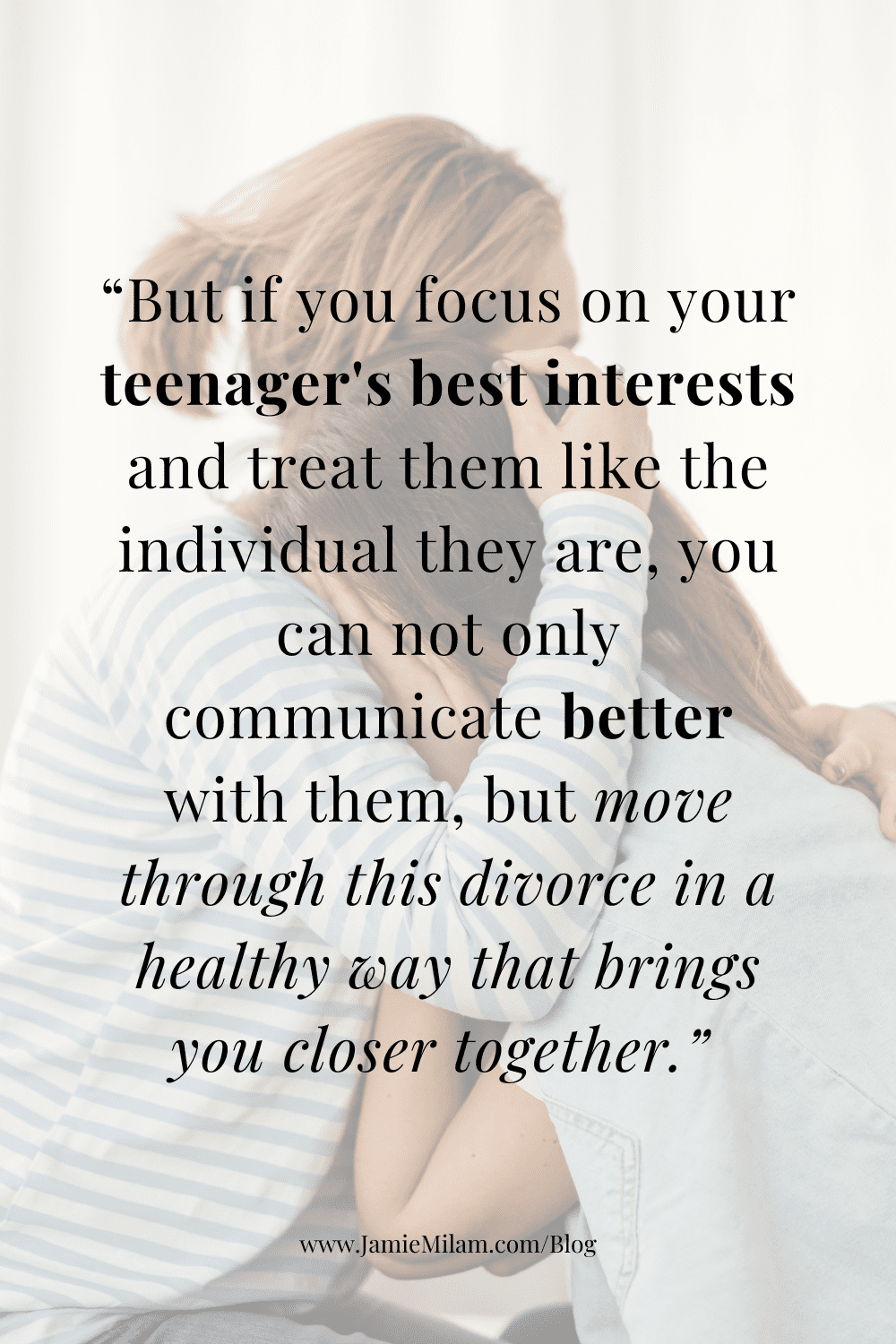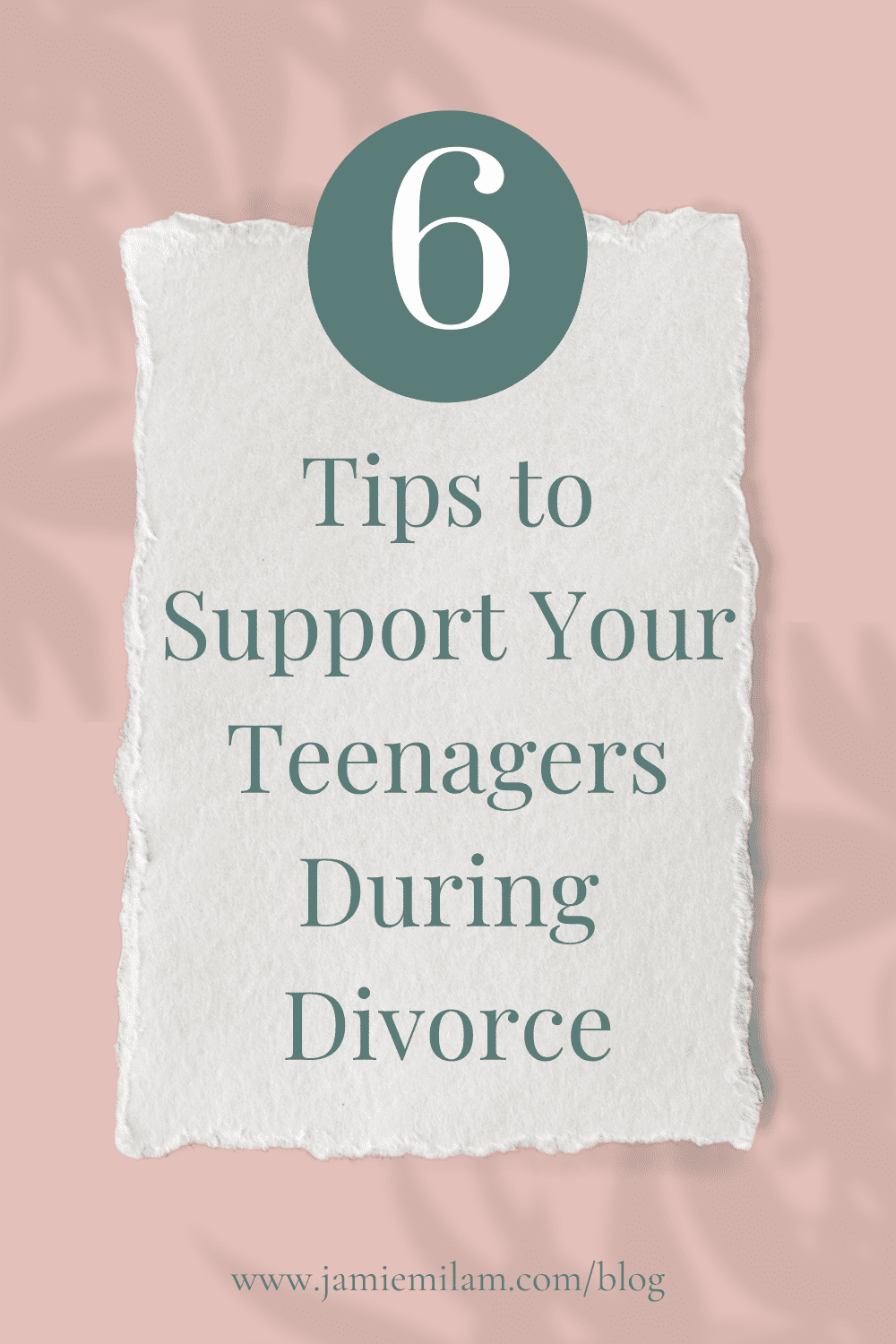THE BLOG
THE BLOG
*This website uses affiliate links which may earn a commission at no additional cost to you. As an Amazon addict and Associate, I earn from qualifying purchases, but I'm only recommending products I love!
Browse More Blog Posts:

Supporting Your Teenagers During Divorce: 6 Practical Tips to Implement
Author: Jamie Milam
Date: September 30, 2024
If you're going through a divorce and have children, chances are one of your biggest concerns is how they will deal and cope with this major life change.
And while that's a valid concern, it doesn't have to take over your life with worries and fears.
Because while your divorce will impact your children at any age, the best version of you is what's best for them. Plus, there are many solid strategies you can employ to support your children through divorce.
How you'll handle conversations and decisions will largely depend on their age and maturity. My son was a teenager when I got divorced, which is a whole different thing than having young children. My son understood what was happening, had thoughts and feelings and opinions about it, and we could actually talk about it.
But that's the thing—just because your teenager seems mature enough to handle more information, doesn't mean we should be dumping it all on them. We need to have wisdom about what to share and where to hold boundaries.
Here we'll talk about supporting your teenager through divorce and offer six practical strategies to use today.
Supporting Your Teenager During Divorce: What to Expect
Teenagers may understand more about your relationship and divorce then small children, but they still are children. It's important to make that distinction and keep the mindset that they are learning, growing, and developing into adults. So, how you interact with them will be vastly different than your adult family members and friends (no matter how mature your teen is).

1. Teen Guilt
Because they observe your relationship and know you and your ex are going through a lot, teenagers often feel a sense of guilt about it. They may know that their parents disagree on things related to them—even if you aren't saying that—and feel a level of responsibility for the dissolution of your marriage.
And because they don't want to add more stress, they may stay quiet and not share their feelings. It's so important to reassure your teen that they are safe to say whatever they want—they are not a burden to you, nor are they responsible for the situation. Focus on connecting with them throughout the whole process, creating space for them to open up and share, and reassuring them that they are not the problem.
2. Difficulty Communicating
Along the same lines, teenagers may struggle to communicate what they're thinking and how they're feeling about your divorce. This could be because they don't understand it themselves, or they don't have the language to express it.
Complex emotions like anger, fear, worry, or frustration may prevent your teen from communicating openly with you. So, if they're quiet and don't seem to want to talk, don't be surprised. Instead, focus on making them feel safe and comfortable for when they do want to talk.
3. Strong Opinions
Some teenagers will clam up, others will express their opinions—strongly. They may openly challenge you and your decisions, reacting with anger or frustration.
If this happens, make sure they know you're open to discussion and want to hear their opinions. While you cannot always go along and make the decisions they want, you can hear them out and respect where they're coming from. Whenever possible, include your teenager in decision-making and honor their choices. This builds trust and lets them know you value their opinions and want to do what's best for them.
4. Dysregulated Emotions
Divorce brings up big feelings for all parties involved and, because of their developmental stage, it's harder for teenagers to regulate their emotions. It's common to see outbursts of anger or tears, or behavior that's not congruent with how they normally behave. Expect this and use it as a learning opportunity about how to regulate emotions.
They're still learning to do this, and you have a chance to model healthy emotional expression. But to do it, you need to be working through your own side of things—in therapy or through journaling and other mindfulness practices. Then, you can help your teenager do the same thing.
The first step in supporting your teenager through a divorce is expecting the ups and downs and allowing space for it all. When you're expecting it, you can better prepare for it.
6 Strategies to Support Your Teenager During Divorce
Supporting your teenager through a divorce doesn't come with a 10-point list. There's no perfect way to handle it, because each teen and each situation is different.
There are, however, some best practices and strategies you can employ to help with the transition. They center around creating a strong relationship with your teenager—one where they feel safe, valued, and loved. One where they know they can share how they're feeling with you and be heard... one where their opinions matter.
It's the exact opposite of authoritarian-style parenting, or "my way of the highway" type of parenting. If you come in demanding certain behaviors, not listening to their concerns, and shutting down conversations, you can expect rebellion, lack of communication and emotional shut down.
But if you focus on your teenager's best interests and treat them like the individual they are, you can not only communicate better with them, but move through this divorce in a healthy way that brings you closer together.

Here are some strategies that foster relationship and support your teen through divorce:
- Include your teen in some decision-making: While you can't let your teen dictate everything and need to remain the parent here, you can—and should—include them in some decision-making. This is particularly relevant for co-parenting arrangements. Teens often want to spend time with their friends and may resent being "forced" to be with one parent during the visitation weekend or time slot. They need time to "settle back in" to a feeling of home, so requiring to switch homes every other day can be taxing. Factor that in when deciding on a co-parenting schedule.
- Be BIFF: I love BIFF for CoParent Communication. It was recommended to me by a therapist and has been very helpful in approaching co-parenting teens. BIFF stands for "Brief, Informative, Friendly, Firm" and offers a practical way to work together for your teen's best interest. When talking to your ex and co-parent, make sure you keep things relevant and focused on your teen's best interests. As hard as it can be to avoid getting into the weeds of your emotions when speaking with your ex, resist the urge and keep it simple.
- Keep details to yourself: The ins and outs of your divorce are adult matters and your teenager doesn't need to know them. When asked direct questions, it's okay to say, "You know honey, some of these things are just between your father/mother and I, so I don't think is appropriate to share right now. What's most important is that you know that we both love you and the better way for us to be our best selves for you is to not be together as a married couple." If the questions still arise, it's likely because they just really feel like they need to know to help them cope. It's important not to bash the other parent and give your child gruesome details, after all, they are a part of them too.
- Opt for counseling: If you're able, booking a handful of sessions with a therapist can help your teenager in a big way. A safe, third-party professional may help them open up and process what's going on. This is beneficial to them, but may help them feel more comfortable opening up to you as well. They can give them additional coping and communication skills that will not only help in this season, but all throughout their life.
- Maintain a consistent environment: With so much change going on, it's important to try to maintain a consistent environment as much as possible. While you may decide to give up the family home and move, consider staying in the same area so your teenager can be close to their school and friends. Whatever decisions you make, keep your teenager in the loop and offer ample time for transitions.
- Separate "ex" and "parent": Even when it hurts to lose out on time with your child(ren), remember that your ex still does deserve time with them, even if they don't do things the way you would. More importantly, your child(ren) deserves the opportunity to have that relationship with their parent too (assuming it is a physically safe environment, of course). Again, it's hard, but it's one of the best ways to support your teen during this time. They need to see that it's okay to love both parents and not feel guilty for being with one when they aren't with the other.
I wish I could tell you that if you follow steps 1, 2, and 3, it will all be smooth sailing—but life isn't like that. The reality is that parenting is hard, parenting a teen is hard, and parenting a teen through divorce is hard.
But you love your teenager and you want what's best for them. And with this at the center, you will handle this situation well, loving them through a challenging time. Just imagine: what if this is a time where you can actually strengthen your relationship and grow closer? What a beautiful goal, and one that's entirely possible.
If you want to dig deeper into this topic, I invite you to check out episodes episode 74 and episode 75 of the Divorced and Determined AF podcast. Teen educator Ann Coleman shares her advice to parents experiencing divorce, and offers practical wisdom to cultivate a strong and healthy relationship with your teens.
To loving your teens,

Save this post to come back to or share with a friend!

About Me
I'm Jamie Milam, a determined AF woman who's embraced life after divorce by finding peace through self-awareness, intentional decision-making, and thrilling new travel adventures.
As a Realtor® in Charlotte, NC (and your connection to top agents nationwide), I’m passionate about guiding you through your homeownership and design goals—while also helping you create space for the things you love. My mission is to empower you to create a life of alignment too - at home, abroad, and within.
Whether it’s through real estate tips, home design inspiration, or solo travel experiences for divorced, independent women, I hope this space encourages you to discover deeper self-awareness and build a life that aligns with your passions and needs.
Have you scoped the podcast series that empowers women to make aligned decisions in a divorce?

Your Free Charlotte City Guide

Jamie Milam is a Realtor® in the Charlotte, NC area, licensed in both NC & SC, and has the ability to refer you to a number of agent partners across the nation, regardless of where you may live. She is an enthusiast for the power of awareness and believes it can be used in all facets of life to support aligned living.
**Disclosure** This post may contain affiliate links and they are at no additional cost to you, though I may earn a small commission. Don't worry, I only recommend products or services that I have tried or believe would be of great value to you! All opinions expressed are those of my own!
Recent Posts
There's More ▾
There's More ▾
Let me share the goods!
Come from contribution, that's a motto I've valued for years! So... that's exactly what I am to provide you, straight into your inbox each week! No fluff and all open-book. Inspiring you to practice awareness, value your authentic self, and implement strategic actions so you can create alignment in your world to live the life you desire and deserve!









